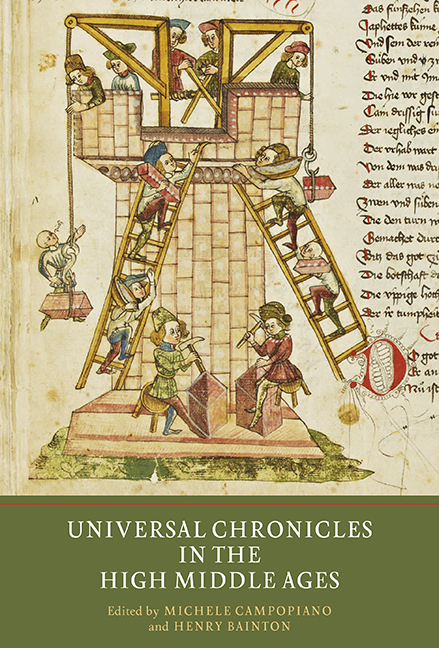Book contents
- Frontmatter
- Contents
- List of Illustrations
- Dedication
- Contributors
- Introduction: New Perspectives on Universal Chronicles in the High Middle Ages
- 1 The First Islamic Chronicle: The Chronicle Of Khalīfa B. Khayyāṭ (d. AD 854)
- 2 Universal Historiography as Process? Shaping Monastic Memories in the Eleventh-Century Chronicle Of Saint-Vaast
- 3 Writing Universal History in Eleventh-Century England: Cotton Tiberius B. i, German Imperial History-writing and Vernacular Lay Literacy
- 4 Political Didacticism in the Twelfth Century: the Middle-High German Kaiserchronik
- 5 Cosmology, Theology of History and Ideology in Godfrey of Viterbo's Pantheon
- 6 Écrire l'histoire universelle à la cour de Konrad IV de Hohenstaufen : la Weltchronik de Rudolf von Ems (milieu du XIIIe siècle)
- 7 Écrire la première histoire universelle en français: l'Histoire ancienne jusqu’à César de Wauchier de Denain et l'adaptation du modèle latin de l'histoire universelle à un public de laïcs
- 8 How Unusual was Matthew Paris? The Writing of Universal History in Angevin England
- 9 The Pillars of Hercules: The Estoria De Espanna (Escorial, Y.I.2) as Universal Chronicle
- 10 La vie d'Alexandre dans la Chronique dite de Baudouin d'Avesnes
- 11 Universal Histories and their Geographies: Navigating the Maps and Texts of Higden's Polychronicon
- Index
- Writing History in the Middle Ages
8 - How Unusual was Matthew Paris? The Writing of Universal History in Angevin England
Published online by Cambridge University Press: 23 June 2018
- Frontmatter
- Contents
- List of Illustrations
- Dedication
- Contributors
- Introduction: New Perspectives on Universal Chronicles in the High Middle Ages
- 1 The First Islamic Chronicle: The Chronicle Of Khalīfa B. Khayyāṭ (d. AD 854)
- 2 Universal Historiography as Process? Shaping Monastic Memories in the Eleventh-Century Chronicle Of Saint-Vaast
- 3 Writing Universal History in Eleventh-Century England: Cotton Tiberius B. i, German Imperial History-writing and Vernacular Lay Literacy
- 4 Political Didacticism in the Twelfth Century: the Middle-High German Kaiserchronik
- 5 Cosmology, Theology of History and Ideology in Godfrey of Viterbo's Pantheon
- 6 Écrire l'histoire universelle à la cour de Konrad IV de Hohenstaufen : la Weltchronik de Rudolf von Ems (milieu du XIIIe siècle)
- 7 Écrire la première histoire universelle en français: l'Histoire ancienne jusqu’à César de Wauchier de Denain et l'adaptation du modèle latin de l'histoire universelle à un public de laïcs
- 8 How Unusual was Matthew Paris? The Writing of Universal History in Angevin England
- 9 The Pillars of Hercules: The Estoria De Espanna (Escorial, Y.I.2) as Universal Chronicle
- 10 La vie d'Alexandre dans la Chronique dite de Baudouin d'Avesnes
- 11 Universal Histories and their Geographies: Navigating the Maps and Texts of Higden's Polychronicon
- Index
- Writing History in the Middle Ages
Summary
At the heart of this chapter stands a question about models. More specifically, I would like to sketch the English background to the historiographical endeavours of Matthew Paris (c.1200–1259), author of perhaps the most famous universal chronicle from medieval England: the Chronica majora (written c. 1240–59). My focus should not be misread as suggesting that there was no European dimension to Matthew's writing – there manifestly was, as anyone who has read Matthew Paris can confirm. However, considering the Chronica's English context raises some intriguing questions. Matthew's was by no means the first universal chronicle to survive from post- Conquest England. So far, though, there has not been much of an attempt to situate Matthew within this insular context, beyond what is sometimes (mistakenly) referred to as the ‘St Albans School’ of historians (about which more below). Yet, by leaving unexplored the question of origins, we are in danger of overestimating the degree of innovation in Matthew Paris, and of underestimating the rich indigenous tradition on which he drew. Most importantly, Anglo-Norman and Angevin writers of history embraced a horizon of reporting that stretched well beyond what we would normally associate with a merely regnal (as opposed to universal) chronicle. Surveying that tradition will help us to get a better sense of what was distinctive about Matthew, but also of the intellectual culture of Norman and Angevin England.
Matthew's example further helps highlight an odd gap in modern scholarship on medieval world chronicles. There seems, in fact, to be an implicit understanding that the genre fell into abeyance between the mid twelfth and very late thirteenth century. The standard point of reference on world histories in the later Middle Ages thus mentions neither Matthew Paris nor any of the other writers of universal history active between Sigebert of Gembloux (d. 1112) and Martin of Troppau (d. 1278): Roger of Wendover, Godfrey of Viterbo, Alberic of Troisfontaines, Helinand of Froidmont, Albert of Stade, or Vincent of Beauvais, to name but the most obvious, are all absent. Such neglect could, of course, partly reflect the fact that, Matthew's Chronica apart, none of these works is available in anything resembling a critical edition. What we have are heavily truncated renditions, if a printed version exists at all.
- Type
- Chapter
- Information
- Universal Chronicles in the High Middle Ages , pp. 199 - 222Publisher: Boydell & BrewerPrint publication year: 2017

